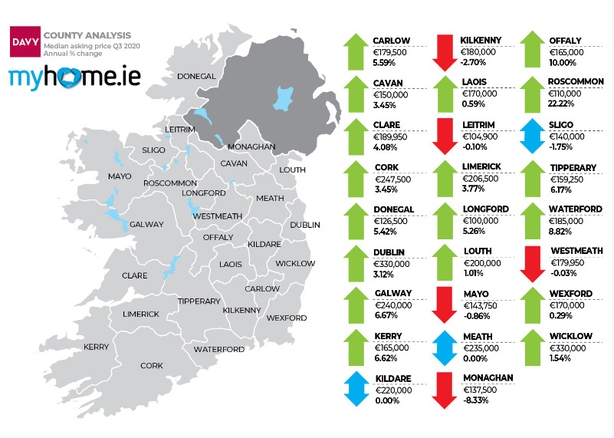The latest house price report from MyHome.ie shows that national house price inflation is at its highest level since the first quarter of 2017.
The report, published in association with Davy, found that quarterly asking price inflation rose by 5.2% nationally - the highest figure since the first quarter of 2017 when it stood at 5.5%.
Asking price inflation increased by 3.7% in Dublin and by 5.6% elsewhere around the country, the report shows.
MyHome.ie said the mix-adjusted asking price for new sales nationally is €282,000, while the price in Dublin is €386,000 and elsewhere around the country it is €236,000.
It said that newly listed properties are seen as the most reliable indicator of future price movements.
Angela Keegan, Managing Director of MyHome.ie, said that strong demand and weak supply caused by the suspension of construction at the height of the lockdown were driving the inflation rate.
She said the website recorded its busiest ever month for website traffic in July, while its latest consumer sentiment survey conducted in August showed that 71% of prospective buyers expected to buy in the next year.
"This shows that buyers appear to have largely been unaffected by Covid-19's economic impact. On the supply side, meanwhile, stock levels are down 25% compared with this time last year," she said.
This combination has led to asking prices being driven upwards," Ms Keegan added.
Conall MacCoille, chief economist at Davy, said that despite the significant increase, the country is not likely to be facing another property bubble and the rise is instead Covid-19 related.
"The news that asking price inflation bounced back to 5% in the third quarter of 2020 could at face value be taken as a sign of a fresh bubble emerging in the Irish housing market," he said.

"However, we would caution that Covid-19 has disrupted the usual seasonal pattern of the housing market and may have flattered the annual comparison," the economist added.
"Just as we thought the -3% inflation reading in the second quarter of 2020 was an aberration, the same is likely true for the +5% recorded here," Conall MacCoille said.
"The truth probably lies close to the middle of these two readings. The third quarter is normally a weak one for pricing, capturing the end of the summer selling season - which has been delayed this year. Hence, asking price inflation will likely fall back in the fourth quarter," he added.
Property prices remaining robust despite coronavirus crisis
Despite the challenges Covid-19 is placing on the wider economy, estate agent Sherry FitzGerald said that property prices have remained robust with a moderate increase in prices in the second-hand market nationwide.
The average value of second-hand homes in Ireland increased by 0.5% in the third quarter of 2020, representing the highest level of quarterly growth in two years.
Prices have now risen 0.6% over the first nine months of the year, the estate agents noted.
Sherry FitzGerald said that Dublin prices increased 0.2% in the quarter and by the same figure in the year to date. This compares to a decrease of 0.5% over the opening nine months of 2019.
Outside of Dublin, price growth was more elevated.
Average national prices, excluding Dublin, rose 1% in the third quarter and are up 1.3% since the start of the year.
Price growth was particularly strong in the West region in the third quarter, increasing by 2.5%.
All regions across the country recorded a rise in prices in the quarter, Sherry FitzGerald noted.
Marian Finnegan, Managing Director at Sherry FitzGerald said that despite the unprecedented shock of the pandemic on the economy to date, residential property prices have demonstrated a remarkable degree of resilience.
"Residential property prices have begun to increase again, rising in both this quarter and in the year to date. Furthermore, potential homebuyers' commitment to purchase has remained buoyant despite current uncertainty levels," she said.
"It is worth noting that the short-term outlook for supply is not encouraging with reduced levels of completions and commencements over much of the spring and summer," she added.

